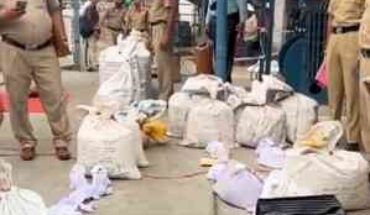Imphal: The agriculture sector in Manipur is facing a severe blow due to the ongoing violence, which could result in a staggering loss of 1543.23 metric tons of rice next year if the main crop cannot be cultivated.
N Gojendro, the director of the Department of Agriculture, reported that as of June, the violence had already impacted around 5127 hectares of agricultural land in Manipur. He expressed concern, stating, “If we cannot cultivate in these areas, Manipur will face a loss of 15,437.23 metric tonnes of rice next year.”
Gojendro explained that Manipur has a total of 195,000 hectares of land dedicated to the cultivation of rice during the Kharif season. However, due to the ongoing conflict, an inquiry was conducted to identify the areas where agricultural activities cannot be carried out. The report revealed that as of June, 5127 hectares of land had been affected.
The unrest in Manipur has had a detrimental impact on farming and agricultural activities across various districts of the state. Bishnupur District has been the most severely affected, with 2191 hectares of land impacted, while Jiribam District has experienced the least impact, with only 37 hectares affected, Gojendro said.
The current situation has prevented agricultural activities in sensitive areas, and this will undoubtedly have an adverse effect on rice production. Gojendro emphasized, “If the agricultural activities cannot be carried out in these 5127 hectares of land, we estimate a loss of approximately 1543.23 metric tons of rice next year. In monetary terms, this would amount to a loss of around 39 crores.”
Given the current situation, the state government has been taking measures to address the situation and provide relief to farmers. Gojendra highlighted the state government’s efforts, stating, “Several meetings have already been convened in the department, minor irrigation department, water resource department, and many other departments.”
To mitigate the expected loss, the government seems to have initiated the distribution of high-yielding varieties of rice to affected farmers. Gojendro explained, “We have distributed a certain quantity of rice mainly to the affected areas through district agriculture officers. I hope that they have already received it.”
He further added: “Additionally, the agriculture department has made efforts to ensure timely access to fertilizers for farmers to properly harvest their crops A substantial quantity of fertilizer has been stored for distribution, with Gojendro himself recently distributing 62,000 bags. District agriculture officers are also distributing fertilizers in their respective districts.”
To ensure fair distribution of fertilizers, the government has implemented a standard operating procedure (SOP). Gojendro stated, “We have already issued an SOP for issuing urea. Farmers can visit the District Agriculture office, get the urea fertilizer, and it will be entered into the system to prevent duplication.”
Taking into account the increased fertilizer requirements from farmers, Gojendro issued a sincere plea, urging them to refrain from succumbing to panic buying and advised them to make judicious fertilizer purchases based on their actual needs. He assured farmers that there would be an ample supply of fertilizers, alleviating any concerns about shortages.






